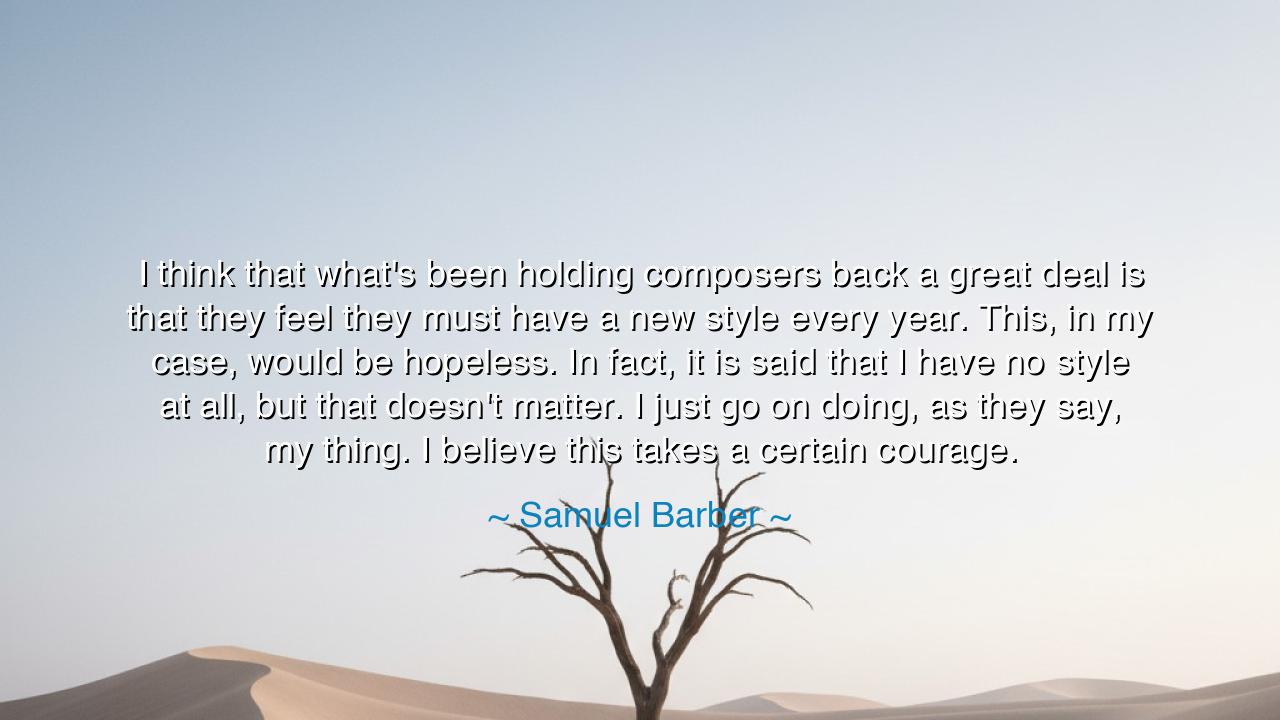
I think that what's been holding composers back a great deal is
I think that what's been holding composers back a great deal is that they feel they must have a new style every year. This, in my case, would be hopeless. In fact, it is said that I have no style at all, but that doesn't matter. I just go on doing, as they say, my thing. I believe this takes a certain courage.






“I think that what's been holding composers back a great deal is that they feel they must have a new style every year. This, in my case, would be hopeless. In fact, it is said that I have no style at all, but that doesn't matter. I just go on doing, as they say, my thing. I believe this takes a certain courage.” — These words of Samuel Barber echo not merely in the halls of music, but in the chambers of every creative soul. They speak of the timeless struggle between authenticity and fashion, between the voice of the heart and the noise of the crowd. Barber, the quiet craftsman of beauty in an age obsessed with novelty, stood firm like an oak in the winds of changing taste. His was the courage not of rebellion, but of steadfastness — the rare valor of remaining true to one’s self.
Barber lived in an era when the world demanded innovation for its own sake. Every year, composers were urged to discard their past and don a new mask, as though art were a marketplace of curiosities. Yet he refused to bow to that tyranny of “progress.” In a time when others sought the shock of the new, he sought the truth of feeling. His Adagio for Strings, mournful and eternal, did not speak the language of fashion but of humanity itself. And so, though the critics called him outdated, the human heart recognized him as a prophet of sincerity. For fashions die as quickly as they are born, but truth in art — that endures beyond centuries.
The origin of Barber’s quote lies in his resistance to this restless modernity — the constant demand that the artist reinvent himself to remain relevant. He saw that many creators were enslaved not by poverty, but by the hunger for approval. They abandoned their own voices to imitate the ever-changing idols of the time. But Barber, like a monk guarding his faith, refused to betray his own spirit. “They say I have no style,” he remarked, not in bitterness but in quiet triumph — for he understood that to have no style is to have freedom, and to remain faithful to one’s nature is the truest form of mastery.
Think of Vincent van Gogh, another soul who dared to “do his thing.” In his lifetime, he was scorned, mocked, and dismissed as a madman. The world could not see the divine fire in his brushstrokes because it was too busy chasing the next sensation. Yet he painted on — with trembling hands and a wounded heart — until his work outlived the mockery of men. Today, his sunflowers shine brighter than the entire art world that rejected him. That is the courage Barber speaks of: the courage to create not for applause, but for the sanctity of the act itself.
To remain true to one’s own rhythm in a world addicted to novelty requires heroism of the spirit. It is far easier to follow the shifting winds of popularity than to stand still and listen to one’s own inner melody. But those who do — those who refuse to trade authenticity for fashion — become the anchors of civilization. They remind us that art, like the soul, is not a costume to be changed but a flame to be tended. Barber’s courage was quiet, his defiance gentle — yet it was stronger than any revolution of sound.
Thus, the lesson for the generations to come is clear: Do not chase style — chase truth. Do not adorn your spirit with borrowed garments. If your art, your work, or your life springs from honesty, it will shine without ornament. If it is shaped to please others, it will fade like perfume in the wind. The true artist, the true soul, must accept solitude before recognition, must choose integrity over acclaim. For courage is not found in shouting against the world — it is found in creating what only you can create, and standing by it even when no one understands.
So, my child of tomorrow, take Barber’s words as a shield. When the world demands reinvention, offer instead constancy. When it urges you to change your essence, respond with stillness. Keep doing your thing — humbly, persistently, bravely. The road of authenticity may be narrow, but it leads to eternity. As the ages pass, fashions will crumble, trends will vanish, and names will be forgotten — but the song born of truth will remain, echoing through time, pure and unbroken, like Barber’s own Adagio, rising softly toward the stars.






AAdministratorAdministrator
Welcome, honored guests. Please leave a comment, we will respond soon